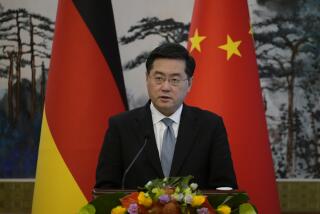China Tells U.S. It Will Block Silkworm Diversion to Iran : Promises ‘Strict Measures’
- Share via
BEIJING — China has given assurances that it will use “strict measures” to prevent the diversion of Chinese-made Silkworm missiles to Iran, U.S. Under Secretary of State Michael H. Armacost said today.
“Our objective is to put the issue behind us,” Armacost told a news conference at the end of a three-day visit to China, during which he held talks with Chinese Vice Foreign Minister Zhu Qizhen and met with Vice Premier Tian Jiyun. He also briefed the Chinese on the recent visit to the United States by Soviet Foreign Minister Eduard A. Shevardnadze.
“Our concern obviously is that weapons of Chinese origin, however they are delivered to Iran, hit American-flagged ships and injure Americans, and also are directed against friendly countries in the (Persian) gulf,” Armacost said.
Beijing has repeatedly denied that it has directly supplied arms to Tehran in the 7-year-old Iran-Iraq War. Officials have said Chinese-made Silkworms have struck at least two oil tankers, one flying the U.S. flag, and a Kuwaiti oil terminal.
Zhao’s Statement
Premier Zhao Ziyang told NBC in September that China would “make efforts to ensure the weapons that China exports will not be acquired by Iran and Iraq by other channels.” But he did not elaborate on how Peking would achieve this.
The undersecretary of state said that, in his latest talks with Chinese officials, “they repeated their intent to undertake strict measures to prevent the diversions.”
“I don’t know what the strict measures are but I hope they are good and I hope they’ll have the effect of avoiding further delivery of arms equipment by whatever means,” he said.
Armacost refused to comment on China’s insistence that it has made no arms sales to Iran but he acknowledged that “there is clearly a difference of views on this issue.”
He declined comment on reports that Washington has shown Chinese officials intelligence pictures of ships loading weapons in China and docking in Iran.
Hopes for New Pressure
Armacost said he hopes that Beijing will place pressure on Iran to prevent it from firing more of the Chinese-made surface-to-surface missiles it already has acquired.
U.S. estimates place the number of Silkworms in Iranian hands at about 30, although an intelligence source in Washington said recently that China has continued delivery of about 50 of the missiles under a previous $1.6-billion contract with Tehran.
The source said China and Iran were also pushing ahead with a second sale under which initial deliveries could number between 25 and 100. He said that while no definitive figures were available, Iran may be trying to buy as many as 200 to 300 additional Silkworms.
Armacost also refused to comment on reports that at least 15 Chinese technicians are training Iranians on how to achieve greater accuracy with the Silkworms.
U.S. intelligence sources say that since 1980 Iran has bought at least $2.4 billion worth of Chinese arms, including Silkworms, shoulder-fired SA-7 anti-aircraft missiles, Soviet-designed T-59 tanks, 130-millimeter and 155-millimeter field guns and Chinese F-7 fighter planes.
More to Read
Sign up for Essential California
The most important California stories and recommendations in your inbox every morning.
You may occasionally receive promotional content from the Los Angeles Times.













